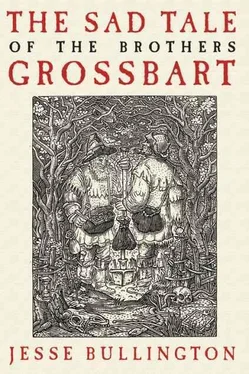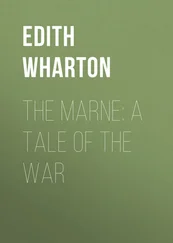“Course we do,” Manfried said, digging the snow out from the bottom of the door.
“Got it?” Hegel asked, setting down the prybar.
“Yeah,” Manfried sighed, “but they got us good, too. What you make a this?”
Hegel hunkered beside his brother. Thick stones and masonry sealed the bottom of the door. The Grossbarts had encountered worse. They dug in their bags while Ennio paced, staring aghast at them.
“What could the inside tell us of the town? Or that stink by the gate?” Ennio demanded.
“Nuthin,” Hegel said, pulling out Manfried’s hammer and chisel.
“Less than,” said Manfried. “Inside a graves only tell the future, not the past.”
“Common misconception,” Hegel agreed, setting the chisel in place.
“What?” Ennio’s head swam. “What nonsense are you speaking?”
“Well,” Manfried said, raising his hammer. “The content a this here stone-house’ll tell us what’s to come. If it’s full a riches, then we’s rich, and if it ain’t, we ain’t.”
“Course there’s a deeper meanin,” Hegel said, pulling his own chisel out and using the flat end of his pick in lieu of a hammer. “And even if it’s empty we’s needin all the practice we can get fore hittin up them what the Infidel’s got. Heard they’s specially tricksome to get into.”
Both struck at the same time, the metal ringing out in the stillness. They shared a smile, the familiar sound a balm to ward off the chill of weather and witch alike. A faint echo returned, and at this they struck again, stone splintering off the crypt.
Ennio let fly a string of foreign curses, then remembered himself. “You intend theft from the dead? You’re defilers of graves!”
“Ennis-” Manfried began.
“Ennio,” Hegel corrected, smashing more masonry.
“Ennio,” Manfried continued, “even a half-wit knows it ain’t stealin if they’s dead.”
“Like rape won’t take away virginity,” Hegel said excitedly, sure his violation at the hands of Nicolette qualified.
“Exactly.” Manfried’s hammer fell again.
“You damn yourselves!” Ennio spluttered. “This sin cannot be undone!”
“We tithe,” Hegel explained.
“Doin Mary’s Will.” Manfried blasted off more stone.
Ennio turned. “We part paths here and now. Sleep in there, for we will not permit you to enter our shelter.”
“You’s drawin lines,” Manfried said, not looking away from his task.
“Never smart,” Hegel grunted, struggling with an obstinate piece of stone.
“Cause then we gotta cross’em,” Manfried finished. Many years had passed since the mortar was laid, evidenced by the ease with which it splintered. Further proof of Her Grace.
Ennio cursed them as he tramped toward the monastery gates. The tolling of their iron made him wince. Fifty paces from the door to the abbey grounds, Ennio saw the wooden gate swing inward. No wind followed yet the stink again permeated the calm air and he paused, peering into the black hole in the wall.
A man floated out of the doorway, his naked skin glowing in the moonlight. From the waist down a bestial form propelled him, snorting menacingly, and Ennio stumbled back through the graveyard, begging his unwilling voice to cry out for the Brothers Grossbart.
X. Fresh Paths and Good Intentions
Heinrich stumbled through the snow, his frostbitten feet gone from cold to numb to searing. Of course they had not stumbled across any free-roaming horses, and of course Egon had turned back upon delivering Heinrich to the frost-blasted boulders where the road entered the mountains proper. Heinrich’s memory of his friend’s hopeless face had faded as if their parting had been years instead of days before. Egon had begged him to turn back, winter coming on far too quickly to risk the mountain passes, but Heinrich would not relent.
Stalactites of frozen sweat, tears, and snot swayed from the yeoman’s mustache but he willed himself forward, even as he realized the setting sun likely heralded his demise. He had to catch them before he froze. He had to.
The storm grew rather than abated, and the hazy orb lighting his way grew less distinct as it slipped lower between the peaks on his right. He had enough of the turnips he so despised to feed himself for another week but without wood for his tinder he held out little hope, even with his blankets. Yet Providence had brought him this far, and his continuous prayers that the villains would appear on the road ahead did not fail, even if they were growing less particular in their destination.
Then, through the shroud of snow and twilight, he made out a shadow sitting on a boulder. Rubbing his bloodshot eyes, he staggered toward it and drew his long dagger. Considering they had left him to suffer in solitude perhaps it was intended he only murder one of them, placing the other in Heinrich’s own miserable and solitary state. Heinrich tried to charge but his legs refused to do more than shuffle over the icy stones.
Then he stopped, vision blurring with grief, and he fell to his knees. The figure had turned and he could no longer delude himself, for the swaddled old woman certainly bore no resemblance to either Grossbart. His exhausted wits did not consider why she would be sitting on a rock so far from anything save a frigid death; all he cared about was his own failure. The sun dipped behind the mountains, and Heinrich somehow found the strength to stand and march onward.
“Ho,” the crone said as he brushed past her, “there’s nothing for leagues save the dens of wolves, and even those will be occupied on such a night. Why not abandon the road and help an old lady to her hovel?”
Heinrich swayed drunkenly but his grief-addled mind refused to allow the intrusion of logic. If he pressed on through the growing dark he would spy their campfire and take them unawares. Only a little farther, surely.
“No?” The woman sighed. “Then that’s another old wife dead due to Grossbartery, and with the little ones in my belly, why, two innocent souls beside.”
Heinrich stopped, the snow settling on his pack. “What?”
“You heard,” she cackled, her laughter like ice splintering underfoot on a frozen river. “You heard, Heinrich Yeoman, digger of turnips, just as you heard your little ones roasting alive in the house you built them.”
Heinrich brandished his knife and stumbled back toward the woman, feverish with hatred and confusion.
“Help an old lady home,” she repeated. “If you wish to see those Grossbarts suffer and beg, there’s no other way. They are too far ahead to catch on foot, and every moment they spread a wider trail between you and they. But there are ways to find them, Heinrich, ways I know well.”
Heinrich stood before her, sweat freezing the dagger to his palm. His teeth rattled, her eyes black specks on a leathery face, and he knew at once she was either witch or spirit. Dejected beyond reason, he attempted to recall the parish priest’s insistences that God alone could punish the Grossbarts, and nodded to her. A lifetime of holy terror had convinced him that without a final confession, Hell might be the only place he could again lay eyes on Gertie, his girls, and poor Brennen.
She rose with the help of a cane and together they began trudging up the road. Heinrich lasted less than a mile before his legs went and he collapsed in the thickening snow. He heard her cooing in the darkness, and something so cold it burned pressed against his lips. He had been Brennen’s age the last time he had drunk directly from a cow’s udder but his gums remembered the method to coax out milk, and with the first drop he felt heat returning to his limbs. His hand went to her flabby breast and squeezed, frigid as what it was, his slurping mixing with her rising moans; a nearby bear retreated up the slope in search of less sinister prey.
Читать дальше












